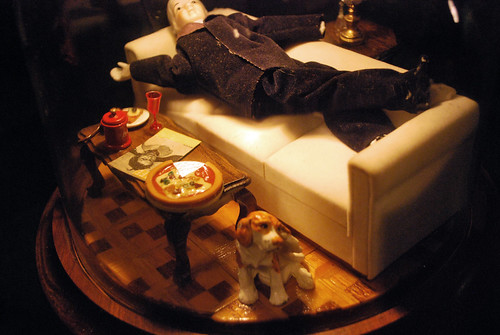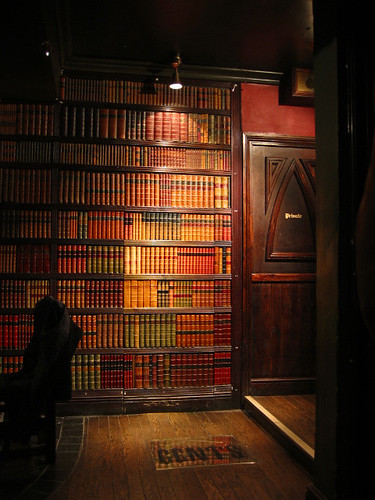
"I had dreams, not nightmares but musical dreams, dreams about transparent questions . . . "--from Amulet, by Roberto Bolano
1 I was reading Neal Stephenson's Baroque Cycle, which I've not read.
"I think dreams have a great many sorts of explanation. Once the Freud virus has, as it were, got into you, you keep on looking at things in that way. But surely there's a lot of pure accident in dreams. One has kinds of obsessions and fears that can't be given a sexual meaning. I think the inventiveness and details of dreams are amazing."--from From a Small Corner in the House of Fiction: Conversations with Iris Murdoch
2 I am playing basketball with the Chicago Bulls. I take a pass and fling up an outside shot, which misses abysmally. I turn around to find Michael Jordan shaming me by wagging a long finger, while Dennis Rodman is doubled over, gripping his knees in helpless laughter.
"The Atlantes, according to my sources, never eat any living thing, and never dream, either."--from The Histories, by Herodotus
3 At my nephew's ninth birthday party I was surprised to notice two guests whose attendance I certainly had not expected: Marcel Proust and Eloise of the Plaza. I got the sense that they'd somehow been invited in error, that it was quite possible that they knew no one at the party aside from each other. That wasn't really a problem, however, as they gave the impression of being the sort of close friends who need little to no outside contact. Huddled together in a corner, they sipped from the tiny teacups of my niece's tea set and quietly shared private, gossipy jokes that caused them now and again to break out in skeins of poorly muffled giggles.
"I knew that in many dreams one must disregard the appearance of people, who may be disguised or may have exchanged faces with one another, like those mutilated saints on the fronts of cathedrals which have been repaired by ignorant archaeologists in a jumble of mismatched heads and bodies, attributes and names. Those we give to characters in our dreams can be misleading. The one we love can be recognized only by the quality of the pain we feel."--from In the Shadow of Young Girls in Flower, by Marcel Proust
4 I am running a marathon in some anonymous but lovely European mountain town. The course, which winds through the narrow, wandering late-medieval streets of the town, is convoluted and difficult to follow, but that difficulty, in the early part of the race, is a help, giving my mind something to focus on aside from the details of my exertion. But around mile twelve I realize quite suddenly that I'm all alone, the body of fellow runners having silently slipped away somewhere along the course. It's clear that I've take a wrong turn and left the course behind. Worried, I look around, hoping to find a guide or a map. All I see is a quaint-looking pastry shop spilling a warm glow of candlelight onto the crooked sidewalk. I enter the pastry shop, conscious of the salty sweat caking my body, and, with apologies for my gross condition, I ask the baker whether he might happen to have a map of the marathon course. Smiling, he reaches into the display case and selects a cookie baked in the shape of an elephant balancing on a ball. He pokes a pudgy finger at the intricate lines that, pressed into the cookie, make up the design. In a voice tinged with a vaguely Germanic accent, he says, "You simply follow these lines." The cookie is a map of the route; the route forms the shape of an elephant balancing on a ball.
With a smile on my face and a cookie in hand, I leave the shop and begin to trot back toward the course.
"It is not much of a dream, considering the vast extent of the domains of dreamland, and their wonderful productions; it is only remarkable for being unusually restless, and unusually real. He dreams of lying there, asleep, and yet counting his companion's footsteps as he walks to and fro. He dreams that the footsteps die away into distance of time and of space, and that something touches him, and that something falls from his hand. Then something clinks and gropes about, and he dreams that he is alone for so long a time, that the lanes of light take new directions as the moon advances in her course. From succeeding unconsciousness he passes into a dream of slow uneasiness from cold; and painfully awakes to a perception of the lanes of light--really changed, much as he had dreamed--and Jasper walking among them, beating his hands and feet."--from The Mystery of Edwin Drood, by Charles Dickens
5 One of the editors at my workplace had arranged for some prominent authors to give lectures on their craft to the entire office. First up were Ernest Hemingway and Joseph Conrad. They took turns speaking, and they actually had fairly interesting things to say about each other’s work. Hemingway was surprisingly self-effacing, and Conrad was exactly as I expected: formal, precise, and thoroughly serious.
It was only after I’d returned to my office following the lecture that I remembered that both Hemingway and Conrad were long dead. “Of course!” I thought. “Those must have been professional impersonators!”
I ran for the front desk, hoping to catch them before they left. Conrad was gone by the time I got there, but Hemingway was just stepping into the elevator. “Wait!” I shouted. “Who do you do when you’re not doing Hemingway?”
Hemingway turned. Then, smiling, he ripped off his mask, held it aloft, and jauntily shouted, "Yourcenar!”
"Against fearful and troublesome dreams, nightmare and such inconveniences, wherewith melancholy men are molested, the best remedy is to eat a light supper, and of such meats as are easy of digestion; no Hare, Venison, Beef, &c. not to lie on his back, not to meditate or think in the day time of any terrible objects, or especially talk of them before he goes to bed. For, as he said in Lucian after such conference, I seem to dream of Hecate, I can think of nothing but Hobgoblins; and, as Tully notes, for the most part our speeches in the day time cause our phantasy to work upon the like in our sleep, which Ennius writes of Homer: as a dog dreams of an hare, so do men dream on such subjects they thought on last."--from The Anatomy of Melancholy, by Robert Burton
6 I was at the zoo, watching a gorilla very close up through the bars of his cage. He gave me a quizzical look, tugged at his earlobe, then pointed at my earlobes while mouthing the word, "Earring?" I stared for a second, then remembered that I was wearing a big, gold pirate-style hoop in each ear.
"There is no great difference, says Proust, between the memory of a dream and the memory of reality. When the sleeper awakes, this emissary of his habit assures him that his 'personality' has not disappeared with his fatigue."--from Proust, by Samuel Beckett
7 I am reading James Boswell's
Life of Johnson and find a typo that somehow turns an ordinary sentence into some sort of prognostication about my brother's life. As I read it I am amused but impressed, and I remember that Johnson himself left a cryptic note about dreams and brothers in his diary. The entry for January 23, 1759, the day of his mother's funeral, includes the line, "The dream of my Brother I shall remember." Johnson's brother, Nathanael, had died at only twenty-four, a possible suicide; his sole surviving letter is an indictment of Samuel for his harsh treatment.
"It makes a difference whether your dreams usually come true or not. . . . See then if you can follow my example, and give a happy interpretation to your dream."--from a letter to Suetonius Tranquillus by Pliny the Younger
8 I was at Wrigley Field to watch a Cubs game, and, as game time approached, I got out my scorebook to take down the starting lineup. The public address announcer began to rattle off the Cubs lineup. "Leading off, and playing right field . . . a sesame ball." I wrote it down. "Batting second, and playing second base, a furry kitten." I wrote it down. "Batting third, and playing first base, Stacey Shintani." On hearing my wife's name, I threw down my pencil and exclaimed to my seatmate, "They're trying to throw this game!"
"My earliest memory is of a dream. It was in the house where we lived when I was three or four years of age. I dreamed I was asleep in the house in an upper room.
Then I awoke and came downstairs and stood in the living room. The lights were on in the living room, although it was hushed and empty. The usual dark green sofa and chairs stood along the usual pale green walls. It was the same old living room as ever, I knew it well, nothing was out of place. And yet it was utterly, certainly, different. Inside its usual appearance the living room was as changed as if it had gone mad."--from "Every Exit is an Entrance (A Praise of Sleep)," by Anne Carson
9 I was reading—and greatly enjoying—Anthony Powell's’s biography of Robert Burton, author of
The Anatomy of Melancholy. It was only after I woke up that I remembered that Powell never wrote a biography of Burton; that was Nick Jenkins, the narrator of Powell’s
A Dance to the Music of Time, who serves as Powell’s stand-in.
"In some ways a narrative is like a dream. You don't analyze a dream--you just pass through it. A dream is sometimes healing and sometimes makes you anxious. A narrative is just the same--you are just in it. A novelist is not an analyst. He just transforms one scene into another. A novelist is one who dreams wide awake. He decides to write and he sits down and dreams away, then wraps it into a package called fiction which allows other people to dream. Fiction warms the hearts and minds of the readers. So I believe that there is something deep and enduring in fiction, and I have learned to trust the power of narrative."--Haruki Murakami, from a lecture in Cambridge, Massachusetts in 2005
10 I dreamed that Van Morrison was at a dinner party I was attending with about a dozen other friends. After dinner, he got up to play a few songs. He ran through a somewhat perfunctory "Moondance," then asked me if I would accompany him on vocals and guitar for a couple of numbers. I don't play guitar, and while I do like to sing, I'm far from a good singer. But, unwilling to refuse Van Morrison, I got up and faked my way through "The Way Young Lovers Do," strumming and singing along. I was sufficiently nervous that I forgot nearly half the lyrics, but Van sang them all beautifully.
Then he launched into Sam Cooke's "That's Where It's At," and suddenly everything was right: I happened across the right chords, was even able to throw in some simple, but convincing finger-picked flourishes, and Van and I sounded stunningly good singing together.
"He was also terrified with manifest warnings, both old and new, arising from dreams, auspices, and omens. He had never been used to dream before the murder of his mother. After that event, he fancied in his sleep that he was steering a ship, and that the rudder was forced from him: that he was dragged by his wife Octavia into a prodigiously dark place; and was at one time covered over with a vast swarm of winged ants, and at another, surrounded by the national images which were set up near Pompey's theatre, and hindered from advancing farther; that a Spanish jennet he was fond of, had his hinder parts so changed, as to resemble those of an ape, and having his head only left unaltered, neighed very harmoniously. The doors of the mausoleum of Augustus flying open of themselves, there issued from it a voice, calling on him by name."--from The Lives of the Twelve Caesars, by Suetonius
11 I was rereading Vladimir Nabokov's
Laughter in the Dark, in the pages of which I encountered a book I hadn't noticed on my first reading:
Ghost Whim, by Robin Anne Powter.
According to Nabokov's narrator,
Ghost Whim is a cultural history of dreaming . . . but before I could learn what would happen if I read a nonexistent cultural history of dreaming inside an actual novel inside a dream, I woke up.
"Night comes when you least expect it. You are making dinner or working late, you look out the window and the sky is already dark. The arrival of night can be elusive, mysterious, and in the city we don't often see it, though we always know when it has fallen. In the country night takes its time. A glorious sunset might flag its approach, yet it seems we can never pinpoint its exact arrival. Nightfall is a subtle process."--from Acquainted with the Night, by Christopher Dewdney















